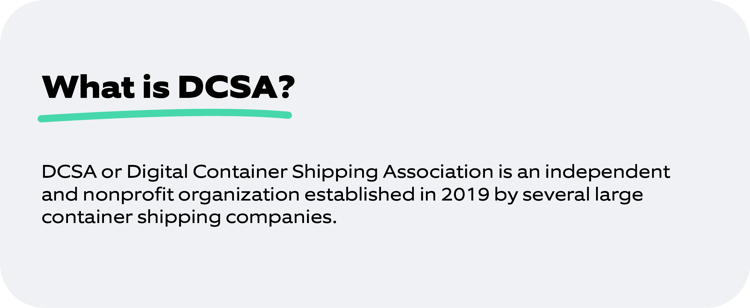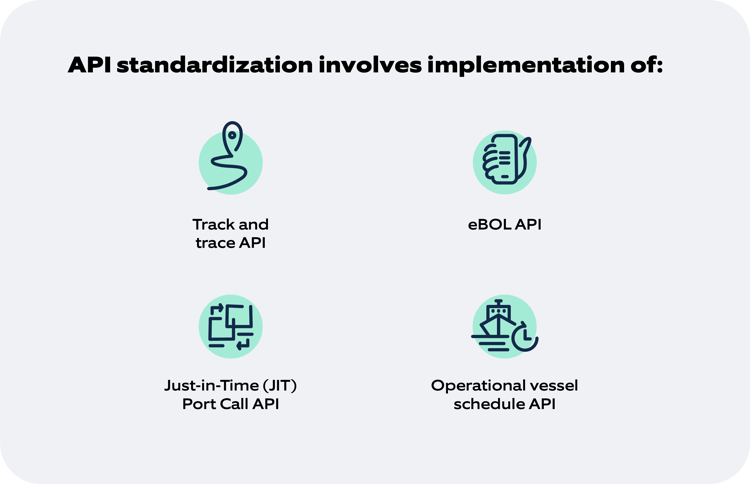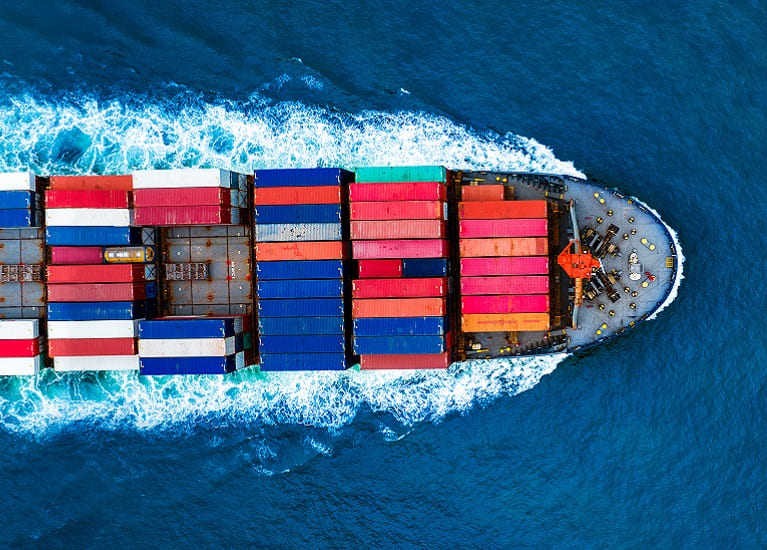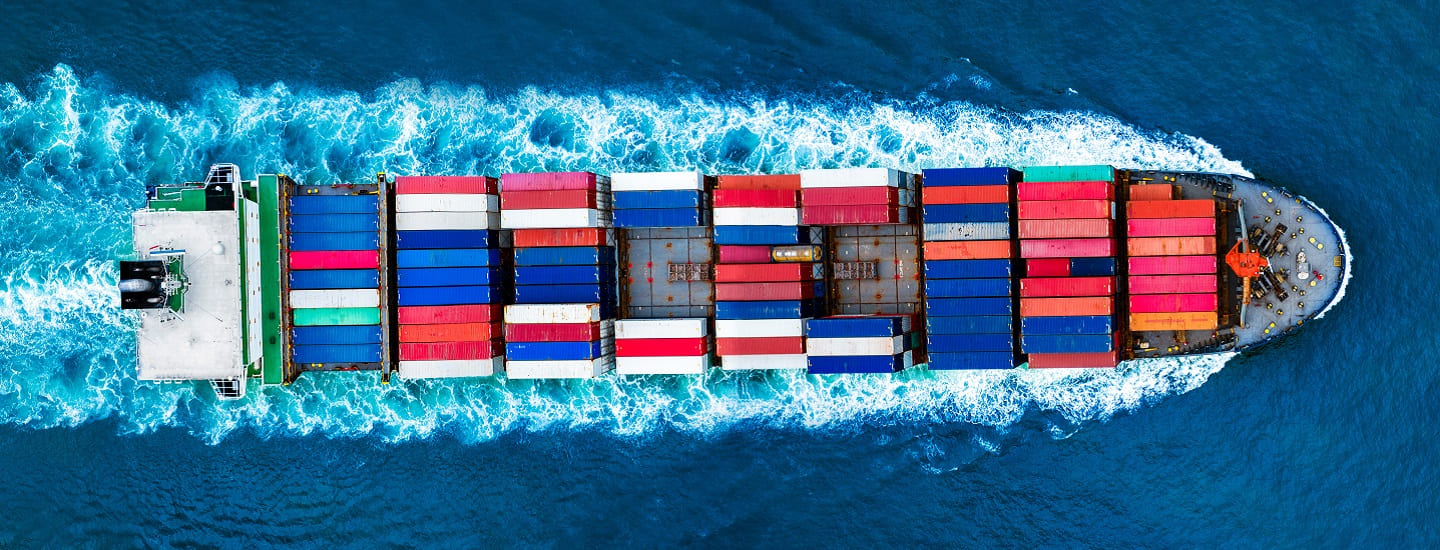Leading stakeholders in industries such as banking, telecom, retail, and airlines have made the best use of the internet to develop and implement the standards for data communication. As a result, these industries have evolved over the years to achieve a better, quicker exchange of information digitally.
On the other hand, the container shipping industry has been lagging when it comes to data standardization, making a constant effort to digitalize the data. Digital Container Shipping Association (DCSA), along with some carrier members, has taken an initiative to kick-start digital standards-based innovation in the shipping industry.

Why DCSA's API standards?
DCSA is committed to driving digitalization and standardization in the container shipping industry through API implementation, constantly working to develop and improve its offerings.
DCSA’s API standards are taking the container shipping industry by storm, by making data accessible and actionable for all stakeholders in international trade. They help shippers track and trace the shipment status by receiving real-time, cross-carrier data on the location of their containers in a streamlined manner. They are strengthening the visibility and real-time responsiveness of the shipping industry, for steadfast performance and a better customer experience.
The need for data standardization
Data visibility is a challenge in the container shipping industry as it's not easy to exchange information digitally without standard formats. The data is not aligned and digitized amongst carriers, freight forwarders, and logistics partners. Due to this lack of visibility of data, the containers are lost from view until they arrive at a certain destination in their journeys.
This problem is aggravated when any event information is exchanged unsystematically on emails, paper receipts, text messages, phone calls, online portals, faxes, etc. The critical data must be aggregated and analyzed for end users to get an accurate estimated time of arrival (ETA) of the shipment.
These discrepancies and missed information make the entire supply chain process time-consuming and inaccurate, which slows down exception handling and prevents smooth operational transitions. Based on these observations, DCSA concluded that shipping information needs to be consistent and accurately conveyed to logistics stakeholders. Therefore, there is a desperate need to standardize the data in the container shipping industry.
What is impacting interoperability?
The container shipping industry is still using EDI (Electronic Data Interchange) where one company sends documents such as purchase orders, invoices, and shipping notices to another company electronically rather than using APIs.
EDI was developed in the late 1960s and was created to replace paper with structured electronic data transmission to eliminate human manual errors and paperwork tasks. As every technology becomes obsolete over a period, the same applies to EDI as well, as it is unable to keep up with the modern customer demands for data visibility.
EDI is outdated for data transmission across the supply chain for the following reasons:
- It takes a while for two businesses to set up and configure EDI systems. Carriers, freight forwarders and many other stakeholders need to be ‘onboarded’. Meaning, their systems should be configured and customized to communicate with other members in this ecosystem.
- EDI is not suitable for real time data exchange. It is designed to transmit data periodically only in one direction. If there is change in the data value or some error occurs, the end user won’t get to know until the next data transmission is scheduled.
Streamlining communications with API standardization
APIs (application programming interface) let supply chain participants transmit and exchange data in real time, unlike EDI. Also, it enables them to automatically request and receive only those data elements that they need. But to fill gaps in existing transmissions, APIs must have normalized standards that are widely adopted by each stakeholder.
API refers to Application Programming Interface, which is a set of instructions and data exchange standards that allows different web-based applications to interact with each other in real time. API does not have any specific user interface to perform the tasks as it directly connects the server to the portals. It performs its functionality in its existing application or plugins.
To increase visibility into container shipping events, an API is required to enable a two-way real-time data exchange where shippers can query the carrier’s system or subscribe to automatically receive status updates for any relevant event. If there are delays or other types of exceptions, shippers are informed in time, which empowers them to work to resolve them immediately.
A shipping API is needed that connects a website or web portal to the carrier's/shipper's logistics functions and the existing business workflows relevant to shipping.
To achieve best interoperability, customer experience, collaboration, and innovation for seamless end-to-end flow of data, DCSA has come up with 3 fundamental ways in which data handling can be addressed:
- DCSA is working to get more and more contributors and adaptors on board to meet requirements for the standards. With their input into the standards, DCSA can help address the gaps in the data and enable all logistics members such as freight forwarders, carriers, ports, and terminals, to deliver the necessary shipping information.
- DCSA has come up with common definition for events and process and common formats to input the data that can be used as global standards by logistics members worldwide. Hence creating a standardized path for everyone to collect, digitalize, and report data.
- DCSA standards include API definitions to enable real-time data exchange, unlike EDI. APIs are the modern method for data communication and can handle billions of real-time interactions every day. Implementing DCSA APIs should be easy for developers trained in restful APIs. Without DCSA standards, moving towards greater visibility and more reliable services is difficult, if not virtually impossible.
Specifications of API standardization and implementation
DCSA rolled out “Early Adopter API Implementation” announcing these API specifications.

1. Implementation of Track and Trace API
DCSA has come up with standards for track & trace that provide data definitions, common language, and processes that all logistics members can use to achieve end-to-end cargo traceability and visibility. They have also listed all relevant guidelines and documents related to industry blueprint, API definitions, design principles, event naming confirmation, etc.
The Track and Trace API, unlike EDI, enables real time exchange of data and communication of events to the end user. This also helps them receive accurate exception notifications of the cargo journey.
The standard API addresses a detailed set of events that cover the entire container journey, starting from booking status, scheduled pickups at the warehouse, first mile delivery, transportation over road, railways, and ocean, to customs and last mile delivery at the customer location. Multiple modes of transportation are also covered such as trucks, railways, ships, as well as operational events like arrival of the vessel and its departure.
DCSA encourages all carriers, ports and terminals and logistics service providers to adopt these standards, as it will allow them to seamlessly exchange data from machine to machine.
2. Implementation of eBOL API
A bill of lading (BOL) is a document issued by a carrier to acknowledge receipt of cargo for shipment. It is a digital alternative to the paper receipt that enables instant, authenticated transfer of original bill of lading documents electronically.
Currently, the bill of lading is mostly paper-based and serves as a document of title, receipt for shipped goods and a record of agreed terms and conditions.
DCSA has published data and process standards for the electronic bill of lading (eBOL) and has completed a proof of concept (PoC) trial with platform providers. This tested eBOL interoperability through the full bill of lading lifecycle using data mirroring a live shipment.
Implementation of eBOL APIs can help in achieving interoperability. Gradually electronic trade records will move through various systems for efficiency and transparency in cross border trading. Customers will gain access to a broader trade ecosystem, allowing faster trade facilitation, access to new ways of financing, eliminate double data entries when communicating with trade participants and regulators, such as National Single Windows or customs systems.
Apart from this DCSA is also working to kick start early adopter programme for API implementation of the following specifications.
3. Implementation of Just-in-Time (JIT) Port Call API
This is a digital platform that enables the optimization of vessel port calls by providing real-time data exchange between ship operators, port operators, and other stakeholders in the port call process. The API aims to reduce the amount of idle time spent by vessels waiting to enter ports or berth at terminals, thereby reducing emissions and improving operational efficiency.
The JIT Port Call API provides real-time data on vessel schedules, berth availability, and other relevant information to all parties involved in the port call process. This allows for more accurate planning and coordination of vessel arrivals and departures, leading to reduced waiting times and improved turnaround times.
The API is built on open standards and can be integrated into existing systems and applications used by port operators, shipping lines, and other stakeholders. Implementation of the JIT Port Call API is part of DCSA's mission to promote digitalization and standardization in the shipping industry, and has the potential to drive significant efficiency gains and environmental benefits in the years to come.
4. Implementation of Operational vessel schedule API
DCSA's Operational Vessel Schedule API provides real-time data on the schedules of operational vessels. This API allows shipping lines, freight forwarders, and other stakeholders in the logistics industry to access the most up-to-date information on vessel schedules, including estimated time of arrival (ETA), estimated time of departure (ETD), port rotation, and other relevant information.
The Operational Vessel Schedule API is part of DCSA's broader mission to promote digitalization and standardization in the shipping industry. By providing a single, standardized source of real-time vessel schedule data, the API can help reduce the inefficiencies and delays that have traditionally plagued the shipping industry, leading to a more efficient and sustainable logistics ecosystem.
Future of API standardization and implementation
DCSA (Digital Container Shipping Association) is actively working on API (Application Programming Interface) implementation to enable standardization and interoperability of data exchange in the container shipping industry. Here are some of the future plans of DCSA for API implementation:
Expansion of Track and Trace API: DCSA plans to expand its Track and Trace API to include a more comprehensive and real-time information sharing on the location and the status of containers.
Development of a Port Call Optimization API: DCSA is developing a Port Call Optimization API to help optimize vessel arrivals and departures, reduce waiting times, and improve efficiency in port operations.
Collaboration with other industry players: DCSA is collaborating with other industry players, including shipping lines, ports, and technology providers, to develop and implement APIs that promote standardization and interoperability in the container shipping industry.
DCSA is committed to driving digitalization and standardization in the container shipping industry through API implementation and is constantly working to develop and improve its API offerings.
Early adopters of DCSA APIs
Here are some of the carriers who become early adopters of DCSA standards and rolled out their DCSA-defined API implementations.
| Carriers | APIs implemented |
| MAERSK | Track and Trace |
| MSC | Track and Trace |
| CMA CGM | Track and Trace |
| Cargo X | eBOL |
| Wave BL | eBOL |
Conclusion
Looking at the current scenario, the container shipping industry is still far behind other industries in terms of data standardization. If logistics stakeholders worldwide are open to adopting standards as set by DCSA and start implementing APIs in their business, then the shipping industry would be able to make a significant change in its operational model and bring an experience that the customers now demand.
To understand more on our capabilities in the logistics industry, check out this page.





